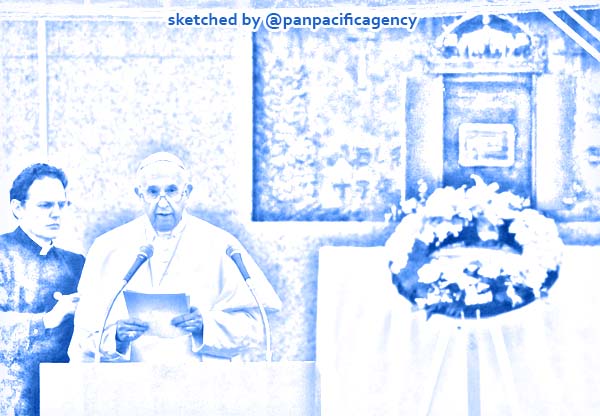Pope Francis says world without nuke arms “possible, necessary”

Pope Francis delivers a message at the Atomic Bomb Hypocenter Park, Nagasaki, on Nov. 24, 2019. Photo: Kyodo News. Sketched by the Pan Pacific Agency.
NAGASAKI, Nov 24, 2019, Kyodo. Pope Francis said Sunday a world without nuclear weapons is “possible and necessary,” calling for action “on the part of all” to realize it in a speech at Nagasaki, one of the world’s two atomic-bombed cities, Kyodo reported.
“A world of peace, free from nuclear weapons, is the aspiration of millions of men and women everywhere,” the pope said in a message delivered at the Atomic Bomb Hypocenter Park in the southwestern Japan city, which he said “witnessed the catastrophic humanitarian and environmental consequences” of a nuclear attack when it was hit by a U.S. A-bomb in 1945.
“To make this ideal a reality calls for involvement on the part of all: individuals, religious communities and civil society, countries that possess nuclear weapons and those that do not, the military and private sectors, and international organizations,” the pope, a strong advocate of ridding the world of nuclear arms, said.
The speech, which lasted for about 13 minutes in rainy weather, came as Washington and Moscow have been at odds over arms control since the expiration in August of the Intermediate-Range Nuclear Forces Treaty, a 1987 pact between the United States and the Soviet Union.
North Korea’s nuclear weapons program and Iran’s nuclear activities have also raised concerns about a new arms race.
The pope warned that a “climate of distrust” risks leading to a dismantling of the international arms control framework, saying the Catholic Church “must never grow weary of working” to support the legal instruments of nuclear disarmament and non-proliferation, including the Treaty on the Prohibition of Nuclear Weapons.
The Holy See was quick to sign the treaty, which was passed in July 2017 with the support of 122 nations, but it has yet to take effect since it has not been ratified by the required 50 states.
Almost all the world’s nuclear weapon powers as well as Japan and other countries under the U.S. nuclear umbrella have been against the treaty.
Speaking in Spanish, the pope asked political leaders “not to forget” that nuclear weapons “cannot protect us from current threats to national and international security.”
“We need to ponder the catastrophic impact of their deployment, especially from a humanitarian and environmental standpoint, and reject heightening a climate of fear, mistrust and hostility fomented by nuclear doctrines,” the 82-year-old Argentine added.
In another veiled criticism of nuclear states, he said that the possession of nuclear and other weapons of mass destruction is “not the answer” to the human desire for security, peace and stability.
The pope also urged the world to “speak out against the arms race,” adding that it “wastes precious resources” that should be used for human development and environmental preservation.
“In a world where millions of children and families live in inhumane conditions, the money that is squandered and the fortunes made through the manufacture, upgrading, maintenance and sale of ever more destructive weapons, are an affront crying out to heaven,” the pope said.
The pope read out the message after offering flowers in front of the hypocenter cenotaph at the park.
He also paid tribute to the Martyr Saints on the Martyrs’ Monument and was to hold a mass at a 25,000-seat baseball stadium.
Later Sunday, the pope is scheduled to travel to Hiroshima, the other Japanese city hit by a U.S. atomic bomb in World War II. He is expected to call for a nuclear-free world in an address at the Peace Memorial Park in the western Japan city.
The pope arrived in Japan on Sunday for a four-day tour, the first papal visit to Japan in 38 years. He was elected as the Roman Catholic pontiff in 2013.
John Paul II, who in February 1981 made the first papal trip to Japan, pushed for the elimination of nuclear weapons during a visit to Hiroshima and Nagasaki amid heightened tensions between the United States and the Soviet Union over the deployment of intermediate-range nuclear missiles.